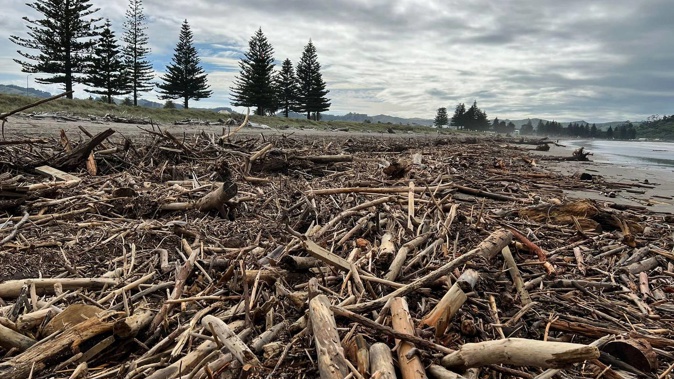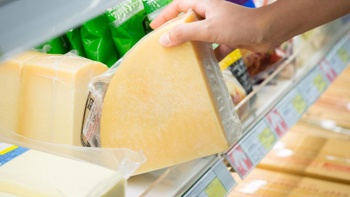
Prime Minister Chris Hipkins today announced a ministerial inquiry into forestry slash, but some in the industry are concerned the timeframe is “too brief” to properly consider the issues.
The two-month inquiry would be chaired by former National minister and Gisborne-based resident Hekia Parata and look at the impacts of slash in Tairāwhiti/Gisborne and Wairoa.
Photos of collapsed bridges with piles of slash at their bases – and anger from those in places such as Tolaga Bay – reignited calls for action on the long-standing problem of debris from commercial forestry.
Hipkins told media today “things have to change because slash on beaches, in rivers, on farms is unacceptable”.
Napier MP and Small Business Minister Stuart Nash said: “What this [review] will do is make recommendations about how we can get this right.”
Gisborne District Council said the announcement was a relief, and CEO Nedine Thatcher Swann said it was the only way the region could get “definitive answers”.
/cloudfront-ap-southeast-2.images.arcpublishing.com/nzme/WNJU7S326JCIDPWXH7FQ67QDXU.jpg)
Prime Minister Chris Hipkins today announced a ministerial inquiry into forestry slash. Photo / George Heard
“It had to be independent, and we thank the Government for listening [to community concerns]. The knowledge and information gained through this inquiry will form the foundation for our region to move forward with sustainable practices on our whenua,” Thatcher Swann said.
“As a council we have prosecuted five forestry companies successfully since 2018 [for slash damage from previous storms].
- Live: Bad weather ends PM's planned Wairoa flight; forestry slash inquiry announced; access closed to Auckland's West Coast beaches
- Forest Owners Association on Cyclone Gabrielle floodwaters spreading forestry slash
- Boy’s death after being struck by log at beach: ‘Wake-up’ call for tree-slash operations
“However, our focus is on preventing these issues from occurring in the first place during forestry harvesting.”
The inquiry will investigate past and current land-use practices and the impact of woody debris and sediment on communities, livestock, buildings and the environment.
It will also look at associated economic drivers and constraints, and would make recommendations by the end of April.
Nash said the forest sector had done a lot of work in retiring certain forests and moving slash from skip sites, but the country had still seen a lot of wood coming onto beaches.
Forestry slash alongside a river seen during a flight over the Gisborne district after Cyclone Gabrielle.
Nash said he wanted the forestry industry to “take responsibility” for their actions regarding slash.
“Forestry companies know they operate under a social licence, and forestry and wood processing employs a lot of people up the East Coast. You’ll never see a recommendation that another tree will not be planted - that won’t happen.
“Keep in mind, in some areas forestry is actually the answer,” he said, noting specific tree planting could be helpful.
Forest Owners Association president Grant Dodson agreed, saying tree-planting was the answer to stabilising highly erodible soil and reducing slips.
“Foresty, as well, provides most of the desperately needed employment in that region,” Dodson said.
“It should not be forgotten that trees are also the greatest practical medium-term tool to reduce net industrial carbon emissions and so combat climate change.”
/cloudfront-ap-southeast-2.images.arcpublishing.com/nzme/3DIOFIPMIVBVZL2HQUHAY4CASI.jpg)
Foresty slash and debris from the apple industry is seen at the mouth of the Esk River in Hawke's Bay after the devastating floods. Photo / Warren Buckland
But Dodson said the forestry industry must take some “drastic steps to stay ahead” of climate change and reduce slash discharges.
“The volumes of slash up against bridges from these events must reduce. We must do better.
“We have introduced safer harvesting techniques since the 2018 Tolaga Bay storm, such as harvesting smaller areas at a time and removing more slash from the forest. We have protected more native tree riparian strips to keep wood out of rivers,” he said.
“The most effective measures, such as new tree species, take time to grow.”
Dodson said the two-month inquiry would “probably [be] too brief to properly consider the intersection of all land uses impacted and the considerable science that needs to be reviewed”.
/cloudfront-ap-southeast-2.images.arcpublishing.com/nzme/MZKKSU73OJF2NGP3PS3R7ML3MU.jpg)
Flooding and slash debris at the Wigan Bridge, Tauwhareparae, Tolaga Bay, in Tairwhiti after cyclone Gabrielle.
“The issues of agriculture, forestry, infrastructure and economic prosperity are complex and interlinked, and so a rush once-over look is probably not going to be thorough and long enough to get past a blame game,” Dodson said.
He said the Forest Owners Association would have preferred to see a higher-level Commission of Inquiry.
And Eastland Wood Council CEO, representing the forestry industry in Tairāwhiti, welcomed the inquiry as a “really clear path forward for the conversations” the industry needed to have.
“We know some things need to change,” he said.
“Across all land users in our region, we need to have a sensible conversation about how we can move forward and what role forestry plays in that future.”
The inquiry members are Parata, former regional council chief executive Bill Bayfield and forestry engineer Matthew McCloy.
“Woody debris and sediment are particular issues for these communities following storms,” Nash said.
“More than 10,000 people in Tairāwhiti have petitioned for land use to be better managed.
“This inquiry is responding to these very real concerns.”
The panel will make recommendations to improve land use, including changes needed to practices and regulation at central and local government levels.
This could include consideration of forestry practices, Resource Management Act plans and national direction - for example, the National Environmental Standards for Plantation Forestry and the Tairāwhiti and Wairoa District Resource Management Plans.
People in affected communities and the wider public will be invited to provide feedback to the panel.
Take your Radio, Podcasts and Music with you

/cloudfront-ap-southeast-2.images.arcpublishing.com/nzme/ETGIDMPL3NCNHGUNYAHDEO4ESY.JPG)








